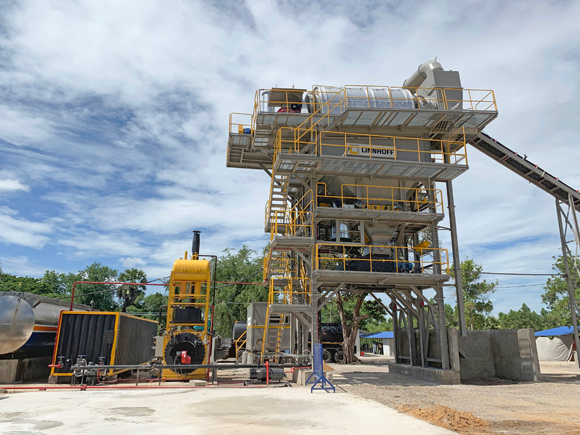
As part of Asian Highway 1, the 366km National Road No. 5 Rehabilitation Project is intended to provide faster, safer road links and a vital trade route between Cambodian capital Phnom Penh and Thailand.
The Lintec & Linnhoff plants are helping with tasks such as road-widening and upgrading the surface from poor-quality double bituminous surface treatment to asphalt.
The batching plants have now produced over 500,000 tons of hot mix asphalt for the National Road No. 5 project, which is currently halfway to completion. The 366km route will form the main trade link between Cambodia and Thailand, as part of Asian Highway 1, connecting Phnom Penh in the south with the north-western border via Prek Kdam, Thlea Ma-am, Battembang and Sri Sophorn.
Work on this crucial improvement scheme began in 2018, following years of neglect which also included a major flood in 2000 that caused substantial damage.
Lintec & Linnhoff says that, with many sections of this primary arterial national road being under 8m in width, the increasing volume of traffic resulting from the country’s recent rapid economic growth called for a drastic upgrade.
According to the original project report from the Japan International Cooperation Agency (JICA), some sections of the road were not even wide enough for two lanes, which causes increased congestion and also impacts road safety. This is also accelerating deterioration, as most sections of Cambodia’s arterial roads are made using double bituminous surface treatment (DBST). This does not have sufficient bearing capacity to support the increasing traffic volume, especially that of heavy vehicles.
With the maintenance of these DBST surfaces imposing a heavy burden on the nation’s finances, the government took the decision to upgrade the whole route to asphalt, a more durable replacement. In addition to adding the new asphalt surface, new roads are being built in several sections, while other parts of the highway will see expansion of the existing carriageway from two to four lanes, reaching up to 23m in width.
“Such an ambitious scheme clearly requires a reliable material supply, so three high-capacity asphalt mixing plants from Lintec & Linnhoff were chosen for the project,,” said Teo Siang Leong, general manager (Sales) at Lintec & Linnhoff Asphalt. "Chief among these is a Lintec CSD2500B containerised asphalt plant, the second largest in the CSD range with an output of between 140 and 160 tons per hour.
“This is proving to be a popular choice with contractors and deliver notable savings in fuel consumption and maintenance thanks to a design that eliminates the need for a hot elevator and vibrating screens through the unique double screen drum technology. With a modular, fully enclosed structure built in ISO shipping containers for economical transportation, installation and dismantling is also easy.”
Also working on the project is a Linnhoff CMX1500 CompactMix asphalt plant. Although classified as stationary models, their modular structure is designed to provide high portability and ease of relocation. Each module of these plants is also compatible with transportation in ISO shipping containers, delivering economical shipping, reducing setup and dismantling times, and providing easy maintenance access at all levels. The CMX1500 CompactMix asphalt plant produces an output of up to 120 tons per hour.













